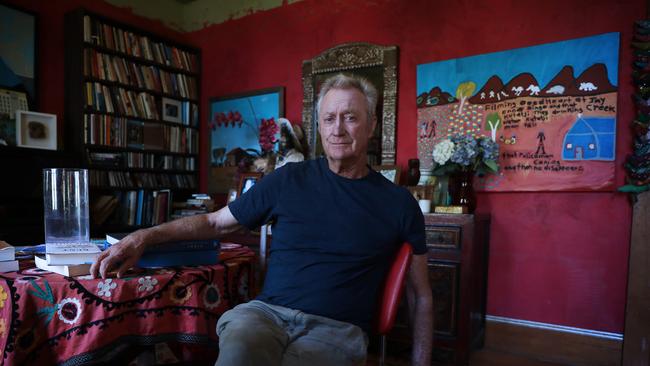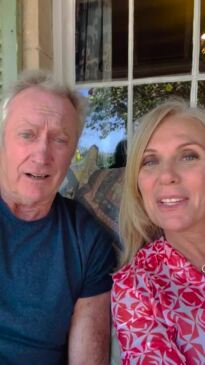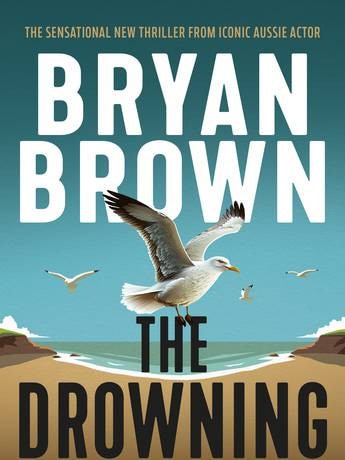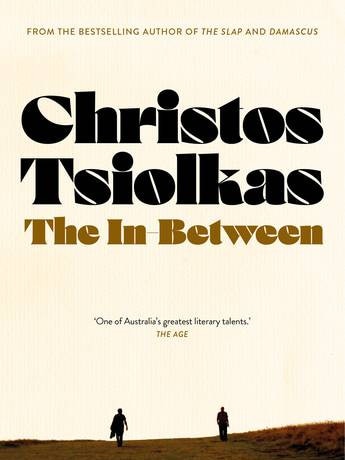The actor Bryan Brown has become the writer Bryan Brown
The actor, who was hospitalised last year, says aspects of his second book had his friends concerned. After reading it ... well, let’s just say you’ll have your hair on end.

Bryan Brown is a funny bastard. I’m sorry, but he just is. He’s quick and he’s dry. Great company, in other words.
His new book, The Drowning, isn’t quite so funny, and I don’t mean that in a bad way, not at all, because it’s absolutely mesmerising but also dark. As it should be because it’s a crime thriller. It starts with the body of an Indigenous boy – the sweetest, most curious kid imaginable – washed up dead on a beach.
Accident or malfeasance?

I don’t want to give the game away, but it’s a cracking story. Evil lurks, even in the glorious little surfing hamlet that Brown has created. It’s very Australian in language and tone, as is the writer, but the subject matter ... well, let’s just say you’ll have your hair on end.
“Okay, so I have a mate who said to me, ‘I’m worried about you Bryan’,” says Brown, during an interview at his place in Sydney’s Balmain (so you know, it’s crammed with art, and there’s a marmalade cat, a rickety staircase, and a water view.) “The things that you’ve written down, they’re pretty scary.”
And with that, he grins, and you know that grin. He’s been charming audiences with it for years.

Brown wrote The Drowning after finding some success with his first book, a collection of short stories, Sweet Jimmy. He wasn’t sure that he had a novel in him but out it came.
“I was up the farm (it’s near in God’s Own Country, up near Byron) and there’s curious kids all around, riding their bikes, being free, and there’s properties with Keep Out signs on the gates, and you put those two things together, and I started thinking about a kid snooping around a property and maybe he’s going to see something he’s not supposed to see?
“That was my starting point. I went from there.”
The kid in question isn’t looking for trouble. He’s actually hoping to photograph a magnificent old car when he steps into the danger zone.
Brown loves old cars, too. He has a 1979 Statesman. It’s burgundy red, and he likes to drive it over the hills and through the valleys and on the back roads near his farm. He knows that part of the world like the back of his hand, which is probably how he brings it so convincingly alive in The Drowning. There’s a cafe in the book called The Basin, where locals hang out. You’re going to swear you’ve been there, but it doesn’t actually exist.
“I made it up from a bunch of places just like that,” says Brown. “Places where locals go after being in the surf. Where tourists go to get that taste of the barefoot Australian lifestyle. And I am really looking forward to the book being out and people from around where I live reading it because there is a little bit about who’s f--king who, and they’re all going to be like, how did Bryan know? So I’m really looking forward to putting that cat amongst the pigeons.”
Besides being a crime thriller, the book is a love letter to Australia and to surfing.
“It’s one of those sports, as soon as you start paddling out, you’re in a whole other moment,” he says. “There are a lot of people up around Byron who have been through different things, and people carry stuff. But the beach lets you get rid of stuff.”
The story would easily lend itself to film, and Brown says “it’s fairly reasonable that I write like I do because I’ve been an actor for 50 years. I’m very driven by characters. I’m always having to interpret what someone else has written down, so I’m very aware that characters drive things. With the book, I get the opportunity to create my own characters and let them take me on a journey.”
The last time we spoke, in 2022, Brown was recovering from a near-death experience. He’d been tasked with clearing some leaves from the property he shares with his beautiful, industrious, remarkable wife, Rachel Ward, and he’d decided, to her future shock, to use petrol.
He recalls the moment:
“I didn’t know if I was alive or dead,” he says. “All I knew was something dreadful had happened to my body, and I wasn’t in control of it, and didn’t know where it would lead, and I threw myself down on the ground, screaming.”
He was in hospital for a while but is now fully recovered. He has skin like a baby on his face. Rachel has joked with him about how people would pay good money to have done what he did to himself. The pain has mostly faded. He’s turned the incident into a funny story. But he did spend some time thinking about life.
“I was brought up a Catholic, and the problem with being brought up a Catholic is it never f--king leaves,” he says. “You give it up for years, and then you go … okay, it’s just hard not to think there’s something spiritual, whatever you want to call it.”
He may not look it, but he is now 76, meaning he’s probably closer to finding out what there might be than he was when he started life’s journey. Not that he’s thinking about his mortality, not at all.
“I think if I got really sick with something, I’d start to think in those terms,” he says. “But you know, I’m pretty active. I’ve got two things people want me to do next year as an actor. There are other things I give my time to that I have to, and look at me, I’ve just written a book. And I enjoyed it, and I might write another one. Because I just enjoy storytelling. And I came up with a pretty good story, didn’t I?”
He most certainly did. The Drowning. It’s out now.
■ ■ ■
The winners of the 20/40 award, an annual publishing prize for fiction and non-fiction prose works between 20,000 and 40,000 words, has been announced by Finlay Lloyd Publishers. They are Rebecca Burton, for Ravenous Girls, and Kim Kelly, for Ladies’ Rest and Writing Room.
Finlay Lloyd publisher Julian Davies said the works were judged blind, “so it was both interesting and pleasing to learn that the two winning books, as well as five of the six shortlisted entries, were by women. While both Rebecca and Kim have been published before, their prize-winning books are, for each of them in their own way, adventurous departures from their previous writing.
“It has been a delight to work with them both through the editing process to bring these engaging and vital books to our readers.”
It’s the first year of the prize, and because there was a low number of non-fiction entries of quality, the judges decided to give prizes to two fiction entries. As awareness of 20/40 grows, they hope to get non-fiction entries “of a quality that demands a place as winning books”.
■ ■ ■

Today’s pages: Christos Tsiolkas has a new book out called The In-Between. It’s a pleasure to publish Stephen Romei’s review. He was intrigued by one of the central themes, the idea that you never really stop loving anyone. If you loved them once, you’ll always love them. Not with the same intensity, or commitment but still in a way that matters.
Also today: we have a cracking extract from Barry Crocker’s new memoir. He describes himself as a crooner. I do love that word. He talks about the sizzle between Rose Hancock and her late husband, Lang. It’s eye-opening.
It’s a pleasure to have the former prime minister, Tony Abbott, in the pages reviewing Anne Henderson’s new book about “Doc” Evatt and Robert Menzies. We have Samuel Bernard’s Notable Books, and we have a new poem. Enjoy.

To join the conversation, please log in. Don't have an account? Register
Join the conversation, you are commenting as Logout